How to Choose the Best Galleyware for your Boat
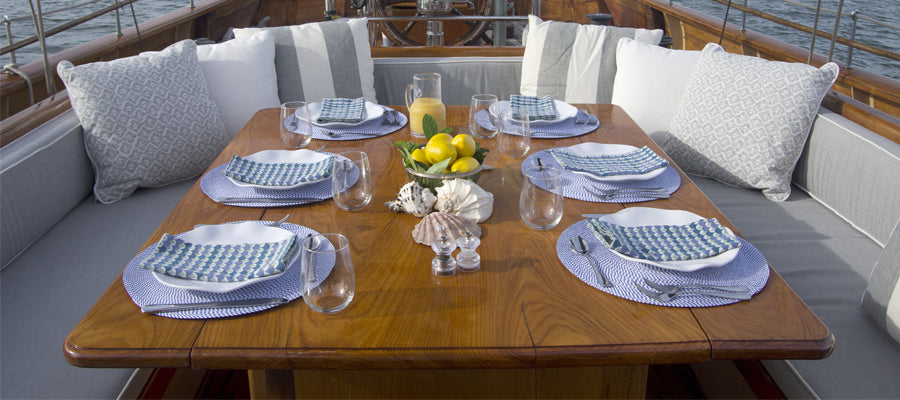
Compared to your kitchen at home, your boat’s galley requires a little extra thought when it comes to dinnerware. Your kitchen does not rock or sway (unless there is an earthquake – oh my!), and likely has a lot more room than your galley. Galleyware needs to be purchased with the limited space and dynamic environs of your boat in mind. In this article we will go over the most common galleyware options to help you choose the best dishes for your boat.
Wood
Some boaters like the look and light weight of wood or bamboo dinnerware. True, the look is distinctive, and wood is lightweight; however, there are some drawbacks to be aware of.
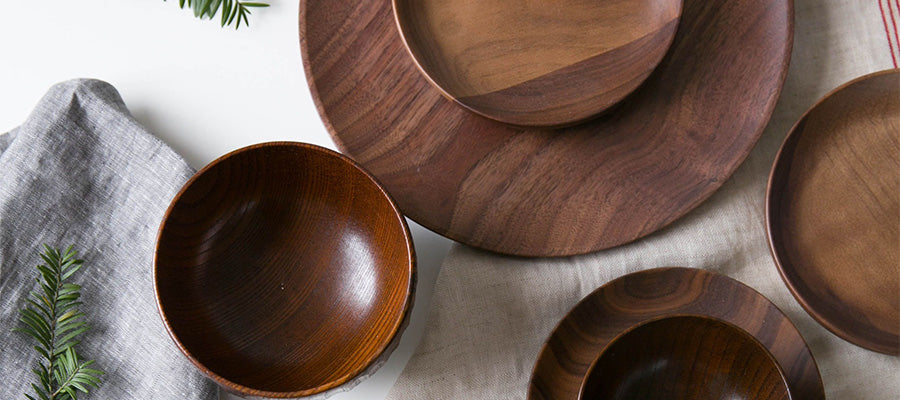 Wood or bamboo can mold, and this is especially true in the damp interiors of boats. In addition, over time the finish on wood dishes breaks down or is scratched off and splintering can occur. On the other hand, wooden plates do not break when falling off a table or shelf, making them boat-friendly in that respect.
Wood or bamboo can mold, and this is especially true in the damp interiors of boats. In addition, over time the finish on wood dishes breaks down or is scratched off and splintering can occur. On the other hand, wooden plates do not break when falling off a table or shelf, making them boat-friendly in that respect.
Plastic
Plastic dishes are a good option to consider in order to avoid breakage. Plastics, especially the softer varieties, are nearly unbreakable when sliding off counters or crashing off shelves. Harder plastics can snap or break, especially in colder weather or after prolonged sun exposure.
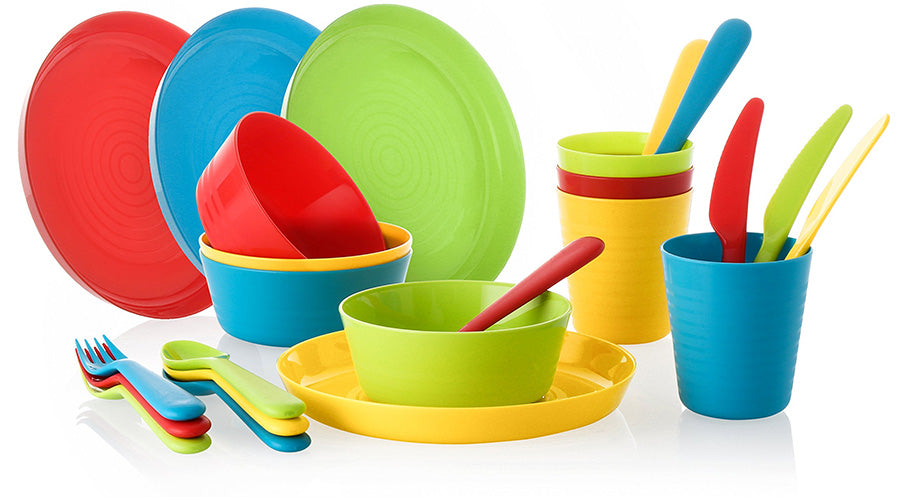 Plastics make for quieter dishes if your boat tends to shimmy and shake. Plastic dishes do get marked up by utensils easily and become harder to clean and can stain. Many plastics should not be put in a microwave and never in the oven, making them less than ideal for reheating on board. Some plastics also give off a smell for some time after purchase as they gas-off. Some people are sensitive to gas-off, but if the dishes are left to air out for several days after purchase, they should be ok to put in the boat.
Plastics make for quieter dishes if your boat tends to shimmy and shake. Plastic dishes do get marked up by utensils easily and become harder to clean and can stain. Many plastics should not be put in a microwave and never in the oven, making them less than ideal for reheating on board. Some plastics also give off a smell for some time after purchase as they gas-off. Some people are sensitive to gas-off, but if the dishes are left to air out for several days after purchase, they should be ok to put in the boat.
Stoneware
There are a surprising number of boaters who stock their cabins with stoneware. It is certainly the heaviest of the options discussed here. One reason for its popularity is its value. Stoneware has a nice look and feel while being inexpensive.
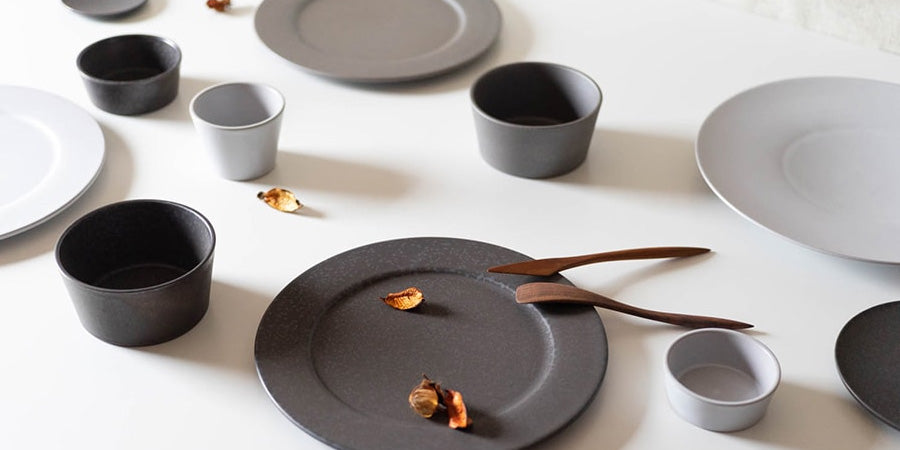 Properly glazed stoneware also stands up to multiple washings and utensil wear. It is great for reheating as it can go in the oven or microwave. On the downside, it is quite breakable and heavy if it lands on a foot, or if it misses your foot, it may dent the deck. It can also chip quite easily, leaving sharp edges.
Properly glazed stoneware also stands up to multiple washings and utensil wear. It is great for reheating as it can go in the oven or microwave. On the downside, it is quite breakable and heavy if it lands on a foot, or if it misses your foot, it may dent the deck. It can also chip quite easily, leaving sharp edges.
Stainless Steel
Stainless steel dinnerware is popular for people who like to travel light such as backpackers, but for similar reasons it works well on a boat.
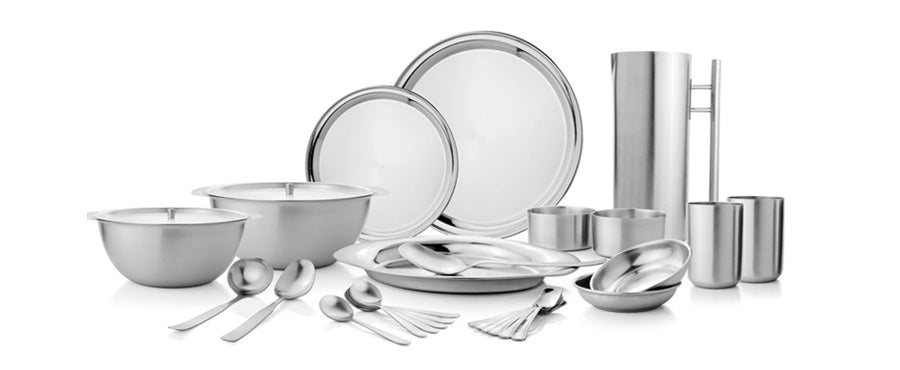 Stainless steel is light, durable, unbreakable, and easy to clean. It cannot go in the microwave, but the oven is ok. The worst that can happen is denting, and dents make obvious breaks in otherwise smooth and reflective surfaces. Some people report an unpleasant taste when eating from stainless steel, especially when drinking wine from a stainless cup. This may be a deal-breaker for those who are able to notice the difference.
Stainless steel is light, durable, unbreakable, and easy to clean. It cannot go in the microwave, but the oven is ok. The worst that can happen is denting, and dents make obvious breaks in otherwise smooth and reflective surfaces. Some people report an unpleasant taste when eating from stainless steel, especially when drinking wine from a stainless cup. This may be a deal-breaker for those who are able to notice the difference.
Corelle
Many boaters swear by Corelle brand dishware. Corelle is a tempered glass product that is durable and break-resistant.
 It takes quite a hit to break one of these dishes, but when one does break, expect countless sharp shards to haunt your dreams as you try to clean up every last one but still manage to get a poke in the bare foot. This is the greatest drawback of Corelle. Otherwise, it is medium weight, microwave safe, oven safe, easy to clean, does not mark or stain, and looks great. You will pay a little more for Corelle, but you are getting a quality dish.
It takes quite a hit to break one of these dishes, but when one does break, expect countless sharp shards to haunt your dreams as you try to clean up every last one but still manage to get a poke in the bare foot. This is the greatest drawback of Corelle. Otherwise, it is medium weight, microwave safe, oven safe, easy to clean, does not mark or stain, and looks great. You will pay a little more for Corelle, but you are getting a quality dish.
Melamine
Besides Corelle, the other standard go-to for boaters is melamine, and for good reason. Melamine is an organic compound that can be made into a durable dish with pleasing high gloss properties.
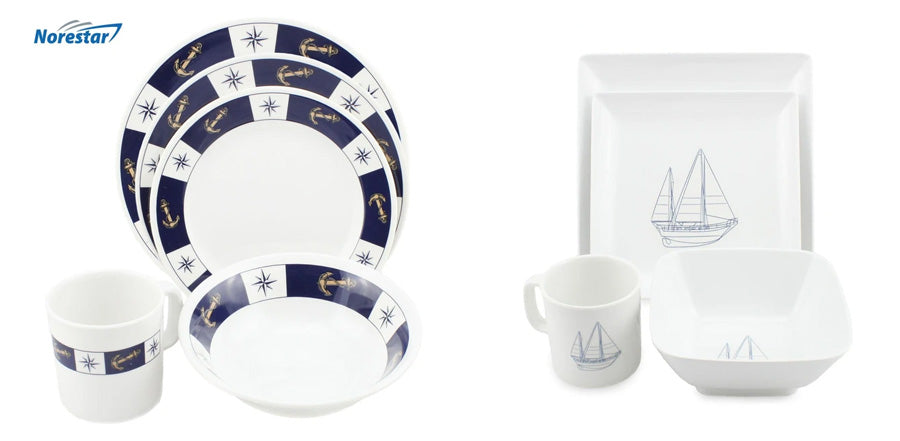 It is also easy to customize with any design imaginable, so there are a vast variety of styles available. Melamine is break-resistant like Corelle, only much lighter. If it does break, thankfully the pieces are larger and less sharp than Corelle. They are also a quiet dish, sounding more like plastic if your boat experiences vibration. But unlike plastic, melamine has no gas-off smell. On the negative side, you cannot put melamine in the microwave or oven. Printed-on designs have also been known to wear down over several uses and washings. It can also get marked up and stain, but not as readily as plastic. One excellent option for boaters who are looking at melamine dinnerware is a non-skid bottom. Many companies offer this option on their recreational styles. This is great as the dishes are much more likely to stay put while your boat rolls over the waves.
It is also easy to customize with any design imaginable, so there are a vast variety of styles available. Melamine is break-resistant like Corelle, only much lighter. If it does break, thankfully the pieces are larger and less sharp than Corelle. They are also a quiet dish, sounding more like plastic if your boat experiences vibration. But unlike plastic, melamine has no gas-off smell. On the negative side, you cannot put melamine in the microwave or oven. Printed-on designs have also been known to wear down over several uses and washings. It can also get marked up and stain, but not as readily as plastic. One excellent option for boaters who are looking at melamine dinnerware is a non-skid bottom. Many companies offer this option on their recreational styles. This is great as the dishes are much more likely to stay put while your boat rolls over the waves.
Disposable
Last, and least, in our opinion, are disposable dishes. While they have their uses for parties or unexpected guests, by and large they are messy and environmentally costly.
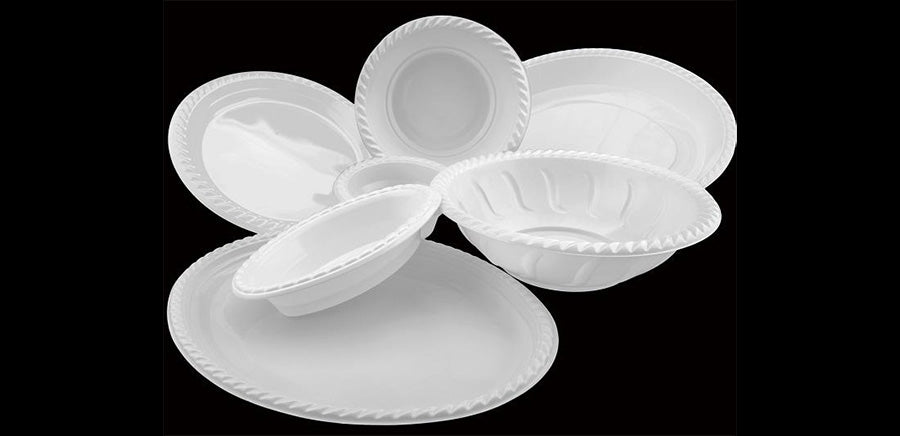 As boaters we want to protect the natural surroundings that we enjoy while boating, and it’s always a let down when we see that all too common red disposable cup floating by, which could very well have got there unintentionally; a simple gust of wind could have swept it off someone’s upper deck. If you do get all the used dinnerware and cups home, it just goes in the landfill. Avoid disposable as much as possible, and if you cannot avoid it, try to get compostable options.
As boaters we want to protect the natural surroundings that we enjoy while boating, and it’s always a let down when we see that all too common red disposable cup floating by, which could very well have got there unintentionally; a simple gust of wind could have swept it off someone’s upper deck. If you do get all the used dinnerware and cups home, it just goes in the landfill. Avoid disposable as much as possible, and if you cannot avoid it, try to get compostable options.
Final Thoughts
There are a few more things to consider now that we have covered the most common types of galleyware. Make sure you measure your cupboard or shelf space before you buy. Boats have odd angles and limited storage. You do not want to bring your brand-new dishes on board only to find that the cabinet door will not close because they stick out an inch. Consider the dish shape too. Square dishes are available and may fit your space better than the typical round.
Your boat rocks and rolls, even when you do not have the music cranked up! Keep this in mind for your storage and place settings. As mentioned above, some melamine sets come with non-skid bottoms, but you can also purchase non-skid placemats that will work similarly on the table, in the cabinet, or in the drawer. Here is a helpful hint about non-skid: even if your dishes do not move, their contents will, so you may want to choose dinnerware with higher, steeper sides.
Finally, make sure your cabinets lock shut or install cabinet locks to keep those dishes in! If you have got shelves, ensure you have lips on them and that they are in good repair. Also, if you can, store your dishes in low shelves or cabinets so that they will not fall as far if they do slip out.
Published
Recent Posts
Our history: a 20 year journey
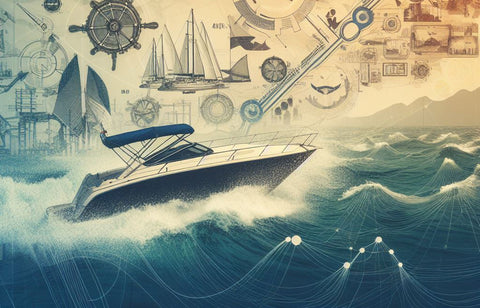
Boat Cleaning Tips for Anglers: Keeping Your Vessel Spotless and Pristine
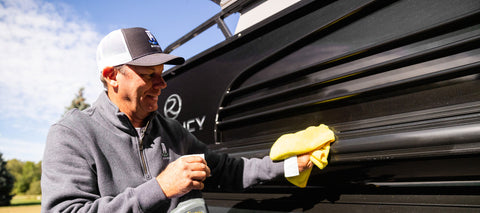
Avast, Ye Mariners! Master the Art of Docking: A Swashbuckling Guide for Boaters
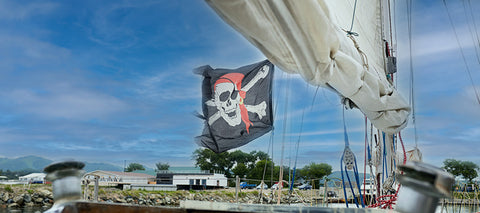
Top Reasons to Keep a Boating Maintenance Log
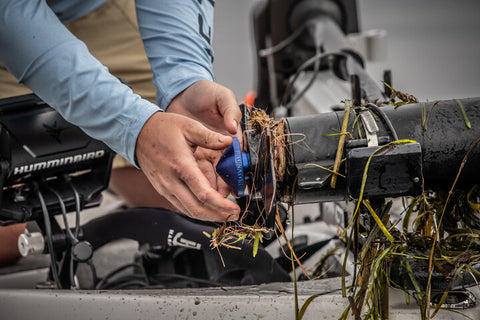
4 Top Tips for Buying a New-to-you Used Boat
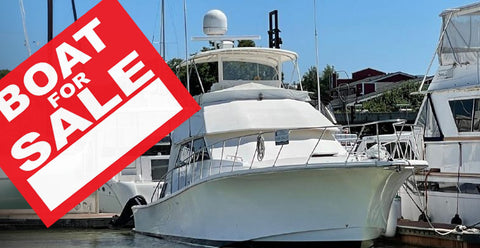
Top Trends in Recreational Boating for 2023
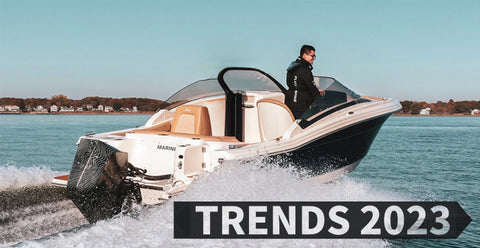
Bent Boat Anchor Shank: Common Causes and Prevention Tips
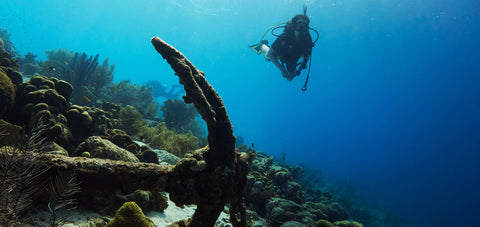
Prepare Your Boat For An Above Average Hurricane Season
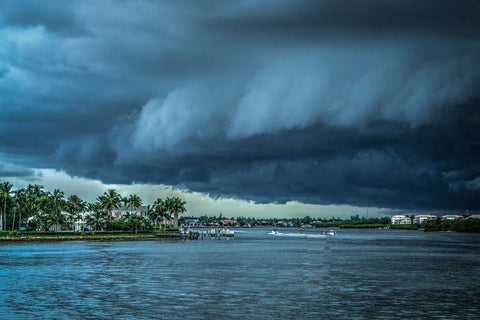
Best Methods For Anchoring Your Jet Ski in Deep or Shallow Water
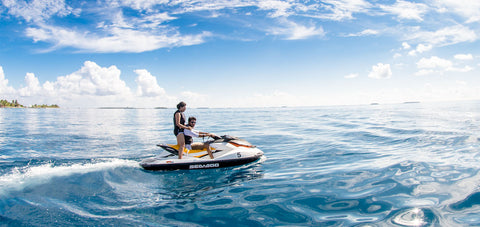
Best Options For Connecting Your Boat To WiFi Internet
